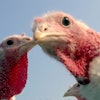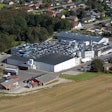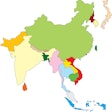Three leading animal scientists were honored as American Humane, the United States' first national humane organization, awarded its prestigious Humane Hero Award to Dr. Joy Mench, Dr. Yvonne Vizzier Thaxton, and Dr. Susan Watkins for their work in helping improve the lives of America's farm animals.
All three serve as volunteers on the Scientific Advisory Committee for the farm animal welfare program at American Humane, which was founded in 1877 and took on as its first task the issue of treating farm animals more humanely. Today, through its American Humane Certified program, the organization oversees the welfare and humane treatment of some one billion farm animals using 200 science-based standards covering everything from adequate space to proper heat, cooling, lighting, food and water, air quality, and much more. Ninety percent of all cage-free eggs in the United States are American Humane Certified.
Dr. Joy Mench was one of the founding scientists and helped draft the first standards for the American Humane Certified program, which was the first farm animal welfare certification effort in the United States and is now the largest and fastest-growing such program. Mench received her doctorate in Ethology (animal behavior) from the University of Sussex in England. She was hired by the University of Maryland, College Park, in 1985 as the first faculty member in the United States focusing on poultry welfare. After 10 years at UMD she moved to the University of California, Davis, where she was a Professor in the Department of Animal Science and the Director of the Center for Animal Welfare. At UC Davis she taught undergraduate courses in animal biology, animal welfare, and ethics of animal use, as well as a graduate course in ethics and professionalism in animal biology. She has published hundreds of articles, book chapters and books on topics related to animal welfare and animal ethics. Dr. Mench has received the Poultry Welfare Research Award from the Poultry Science Association and the Distinguished Scholarly Public Service Award from UC Davis, and has also been elected an Honorary Fellow of both the Poultry Science Association and the International Society for Applied Ethology for her contributions to her field.
Dr. Yvonne Vizzier Thaxton earned her Bachelor of Science and Master of Science degrees from Mississippi University for Women and her doctorate in Poultry Pathology from Auburn University. She also pursued additional studies at MIT, University of Alabama, University of Santa Clara and the University of Wisconsin. After nearly 30 years as a poultry expert, she joined the faculty of Mississippi State University as a Professor in the Poultry Science Department and Interim Department head before her retirement. Subsequently she held the position of Professor and Director of the Center for Food Animal Wellbeing at the University of Arkansas until she retired in 2016. She has served and held memberships on numerous boards and associations during her career, including the Universities Federated for Animal Welfare, Southern Poultry Science Society as President and Executive Secretary, Board of Directors of Central Industries, American Society of Microbiology, American Association of Avian Pathologists, American Poultry Historical Society as president, executive editor of POULTRY magazine, and the USDA Advisory Committee on Meat and Poultry Inspection. Dr. Thaxton was elected to the Mississippi Poultry and American Poultry Industry Hall of Fame. She is a Fellow of the Poultry Science Association and holds Emerita status at Mississippi State University and the University of Arkansas.
Dr. Watkins is an Emeritus Professor with the Center of Excellence for Poultry Science in the University of Arkansas System's Division of Agriculture. Her primary focus is live production with a special emphasis on optimizing drinking water quality and troubleshooting drinking water challenges. During her career she taught Introduction to Careers in Poultry Science, Poultry Production, Professionalism, Integrated Poultry Management and coordinated the departmental internship program. In addition, she conducts research in the areas of on-farm sanitation, nutrition and antibiotic alternatives. In 2016 she became a Distinguished Professor prior to retiring in 2017.
"Between 9 to 10 billion animals are raised on America's farms and ranches each year and their welfare and well-being is a moral imperative that has been advanced through the important work accomplished by these three scientists and animal advocates," said Dr. Robin Ganzert, president and CEO of American Humane. "For their outstanding work in helping improve and ensure the welfare and humane treatment of some one billion lives each year, American Humane recognizes them with our Humane Hero Award."


















